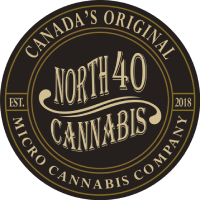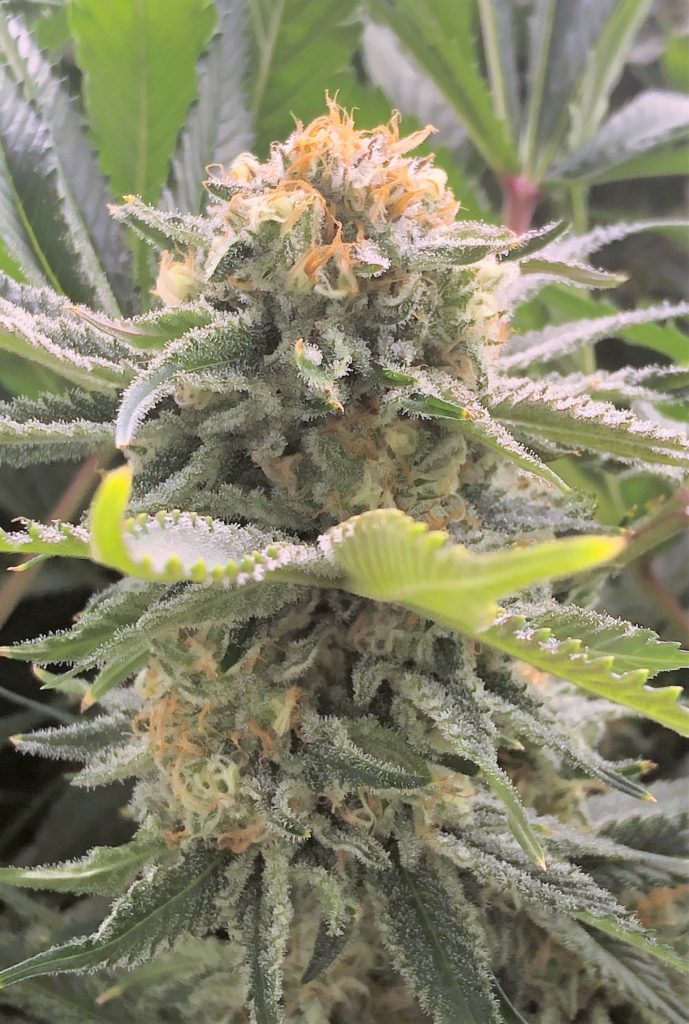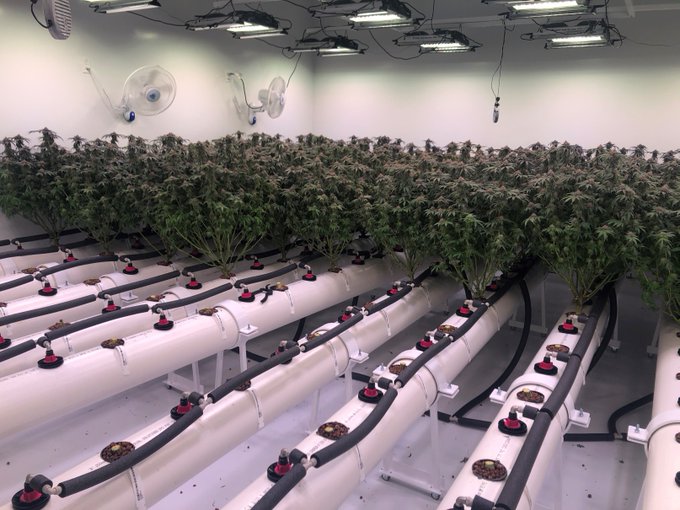
| COMPANY: | North 40 Cannabis Limited |
| LICENCE TYPE: | Micro cultivation and Micro processor |
| APPROACH: | Indoor, high-pressure aeroponics |
| TIMELINE: | ~8 months (November 2018 to July 2019) |
| COST: | $2 million |
| FACILITY: | Indoor, purpose-built |

Gord and Cara Nichol, along with partner Brett Burgess, started North 40 Cannabis Limited in Saskatchewan in February 2018. This was several months prior to the Cannabis Regulations coming into force in October 2018 when applications for non medical cannabis production were first being accepted.
Licensed in July 2019, the company has already been making a splash with their high quality, small batch products that are flying off the shelves in their local market. As founder, Gord Nichol is proud of his company’s achievements, and remains cautiously optimistic about the future of the cannabis market for other small scale growers like North 40.
Ma & Pa growers
The husband and wife team are self-described “Ma & Pa” cannabis growers, with Gord as the Master Grower and Cara as the QAP. They were so confident in their idea, they began planning and designing a facility and even breaking ground prior to sending in their application in November of the same year.
The family ties run deep in this company with Cara’s brother, Dan, being the Operations Manager and Head of Security. Gord’s brother, Bob, is the head of regulatory compliance and was instrumental in writing the GPPs and SOPs. Gord’s youngest daughter, Taylor, recently joined the company as well.
After living for many years in Edmonton and working in the Oil and Gas Industry, Gord Nichol and his wife moved to Nipawin, a small town in north-east Saskatchewan five years ago. Gord shared that he saw the ‘writing on the wall’ for the oil and gas industry and decided he wanted to follow new pursuits.
Although he was not immediately looking at the legal cannabis market, the proud cannabis enthusiast says he was already very passionate about cannabis, having smoked his first joint in 1978 (“and I haven’t stopped since”, he says) and eventually growing for himself with a medical licence over the last few years of the previous ACMPR (Access to Cannabis for Medical Purposes Regulations).
Micro licence category creates possibilities
Looking for a new project in Saskatchewan, Nichol says he saw the first draft of the Cannabis Regulations and the possibility for a micro licence category in late 2017 and decided he would take what he had learned about cannabis throughout his life and finally apply it to a fully legal, commercially regulated facility.
He and his partners began designing the facility in Spring 2018, he says, and building out their business plan, breaking ground on their facility in October and then applying in November. They received their cultivation and processing licence eight months later in July 2019.
So far they have sold three harvests into the Saskatchewan market through their partnership with processor Shelter Market, through over a dozen retail stores in the province. Although they have plans to begin selling through a few retailers in Manitoba, he says it’s possible the market in Saskatchewan may continue to swallow up all that supply before it gets a chance.
Pending sales amendment
Just to get my first shipment of packaging is $17,000, then there’s the stamps, the added reporting, added regulations and SOPs, equipment and boxes, reporting to the provincial government. There’s a lot that goes with that sales licence. So I’m not even sure it’s a money maker at a micro level.
In addition to their micro cultivation licence, North 40 also has their own micro processing licence but is currently selling their harvests through Shelter because they still do not have a sales amendment that allows them to process and package for retail sale.
While the company has applied for one, Nichol estimates the wait could be six months or more, and in the meantime his partnership with the third party processor, as well as a wholesaler, allows him to create an immediate revenue stream to begin to cover expenses.
Plus, he points out, even after the wait of getting the sales amendment, the cost of the equipment for packaging, the logistics of managing these additional steps, might not ultimately make it worth it.
“There’s costs involved in that, too. Just to get my first shipment of packaging is $17,000, then there’s the stamps, the added reporting, added regulations and SOPs, equipment and boxes, reporting to the provincial government. There’s a lot that goes with that sales licence. So I’m not even sure it’s a money maker at a micro level.”
In the meantime, though, he’ll continue to be open to developing relationships with processors to get his product to consumers. In addition, as one of only two micro licence holders with a medical licence, North 40 is now offering products for sale to medical patients through one of Shelter’s additional platforms. While supplies will be limited, this would in theory give those with approval through the medical supply stream access to their product online beyond the Saskatchewan market, from anywhere in Canada.
Custom-designed facility
You could say we built a Bentley. So it wasn’t cheap. From the first dollar spent until our first sale in March of this year was $2 million.
North 40’s custom-designed facility is 7,300 ft2, including their 2,100 ft2 of cultivation space, as well as separate rooms for processing, packaging administration, etc. Their 200m2 of micro cultivation space is divided up into seven flowering rooms, which Nichol says he’s able to harvest about 35-40 lbs from every two weeks.
To fully utilize his small but currently-profitable cultivation space, he’s also recently begun a partnership with cannabis nursery Mother Labs in Saskatoon, who has begun supplying him with new clones every two weeks as North 40 harvests one room and then restarts. Nichol is also working with the nursery to store and even help fully develop the 100+ varieties of starting material he was able to bring in through his own one-time genetic declaration at the time of licensing.
Construction and all associated fees for the custom project was not inexpensive, says the founder. Nichol admits he built the highest quality facility needed including high levels of security beyond what a Micro is required to have, which he felt was appropriate for his location.
“We built a Cadillac,” he chuckles. “You could say we built a Bentley. So it wasn’t cheap. From the first dollar spent until our first sale in March of this year was $2 million. That includes from the time the surveyors came out, right through construction, application, insurance, design, labour, fertilizer, phones, you name it.”
No plans to expand beyond micro canopy
I believe what I’m doing here and the success I’m having is because I’m a small producer, and I’m not sure that these types of results can be done at a larger scale.
Although Nichol and his team built out such an advanced facility, he says North 40 probably doesn’t have any plans to ever expand beyond the micro canopy, saying he’s not sure it’s possible to grow the kinds of quality cannabis he can produce now on a larger scale. As long as he can still be profitable at his current scale, he says he’ll probably stick to that for now.
“I believe what I’m doing here and the success I’m having is because I’m a small producer, and I’m not sure that these types of results can be done at a larger scale,” says the head grower. “So far there’s been very limited success in doing so, so I don’t know why I could if so many others haven’t been able to.”
The longtime cannabis enthusiast says he thinks there’s opportunity for other growers with his kinds of skills and background. While emphasizing that it’s a steep learning curve for those unable to handle a highly regulated industry, he says that the work done by many early applicants has helped clear the path for others later on.
“The information that is available now, the guides that are available now from the work people like us have all done, there was none of that when we started,” he points out. “We were designing a building without knowing what they were going to require, and no information, no feedback from Health Canada… it’s hard to do business like that, but I think it’s now a little easier for the later stage applicants.”
He also reminds that it takes doing a lot of it yourself, pointing out that in addition to founder and Master Grower, he’s also the salesman, the delivery driver, the finance officer, the company’s social media guy, marketing guy, janitor, and trimmer.
“There’s nothing that happens here that I don’t do”
If they can’t grow a different product, besides what’s out there already, they are on the wrong track.
Surviving as a small business, especially since the Covid-19 pandemic
Despite being optimistic about the kind of product he can grow and the prices he’s currently getting, Nichol says he’s concerned for many new companies who don’t necessarily have those same skills.
“Honestly, I’m afraid a lot of people won’t survive the market, even before this current economy (because of COVID 19). Although I do think there are a lot of chances for small businesses who know what they are doing, there’s going to be some pain for people who aren’t going to be able to grow what needs to be grown to succeed. They’re going to have a hard time getting the dollar they are going to need to for the product.”
“I think the market price will be dictated on quality,” he cautions. “I’m scared by what I see a lot of the micros are going to be able to grow, in terms of quality. If they can’t grow a different product, besides what’s out there already, they are on the wrong track. I get calls from people who have never grown pot before who think ‘it’s just a weed’ and nine out of ten of them have never read the Cannabis Act.”
Relying on outside help
…if you don’t have records that you cleaned it, can’t prove your compliance, you might lose that crop. Some people are going to struggle with that sort of thing.
Reliance on outside help and consultants is another big problem, he says.
“I’m going to say more of the late term applicants are better positioned than that, but I worry about people who have to hire consultants through the process, because they should know everything the consultant is going to tell them. Those who have hired someone else to do this learning for them are going to have a tough time staying compliant, because the rigours of the Health Canada inspection are extreme and you need to understand every step of the process, every bit of the regulations, before they invest one dollar.”
Giving an example of the 200 pages of paper his SOPs call for to record and document the harvesting of just 100 plants from one of his flowering rooms, he emphasizes this level of scrutiny will be very hard for some who are used to just growing and selling cannabis in an unregulated space.
“We come from a highly regulated industry,” says the former O&G manager, “so we’re used to this kind of stuff. But Joe, who’s been growing in his garage and doing a great job of that, is going to be crippled by this. The trouble is there’s not many shortcuts because all you need to have happen is have Health Canada come in and say ‘what did you do to this room before you planted’? And if you don’t have records that you cleaned it, can’t prove your compliance, you might lose that crop. Some people are going to struggle with that sort of thing.”
And the current economic challenges from the COVID19 pandemic, he adds, could lead to even more problems for those who don’t have a solid plan together.
“I try not to be a Debbie Downer, because maybe a week ago the reviews and comments I was seeing about our products online and from the retailers were phenomenal, and that had me on top of the world. We were moving a quality product, and those were all really positive things, but this whole new issue does have me a little worried.”
He hopes the federal and provincial government helps out workers and consumers so the economy can keep moving and smaller growers like himself can still survive.
“I wish them all the best of luck, I do, because lord knows they didn’t need this added hurdle, but hopefully it works itself out.”














